Italicized links open a new window to an external site
At War with Iraq: the Propaganda Battles
In the buildup to the 2003 war against Iraq, the US government and domestic mass media mounted an unrelenting propaganda campaign to mobilize US and world support. (Here is a very good look at its origins as they appeared from the perspective of Fall 2002.) For months on end, the mass media and government officials repeated in innumerable ways the message that "we are good and they are bad". While succeeding domestically in the US (click here to see how well), this campaign appears to have failed internationally (see this Pew Center poll and this New York Times article). I attribute this to the fact that the media in other parts of the world focused more on the consequences of American military intervention than on the abuses of the Iraqi government (disparaged as a regime in the US).
The posters above represent one major argument from each side of the debate. Click on each to read analyses I prepared for them using my propaganda analysis form. As you review these analyses, and the material found via the links in the tables below, please remember that propaganda is information designed to manipulate your behavior or beliefs. Its authors have their minds made up, and are interested primarily in winning you over, not in engaging in open-minded debate. The most effective propaganda seems to be that which stimulates a strong emotional response in the recipient by presenting biased information that may be true or false. Through constant repetition and card-stacking (eliminating information that may also be true but does not lead the recipient to the desired conclusion), successful propaganda campaigns lead the recipient to a pre-determined goal.
If you've examined other pages in the propaganda section of this site, you may recognize that the propaganda techniques used in the above posters were developed during the major wars of the 20th century. If not, see the Faces of the Enemy and Dueling Posters pages. And, for an interesting take on how and why American-style propaganda works, read Propaganda: Nobody Does It Better Than America.
In July 2003, Tarcher/Putnam published Weapons of Mass Deception: The Uses of Propaganda in Bush's War on Iraq by Sheldon Rampton and John Stauber. For links to reviews, look at the this PR Watch page. You can read an excerpt here.
In September 2006, Rampton and Stauber published The Best War Ever: Lies, Damned Lies and the Mess in Iraq, a sequel to Weapons of Mass Deception. In the window that will open when you click on the new book's title, you'll be able to read an excerpt and watch a riveting video.
Also in 2006, Norman Solomon published War Made Easy, his examination of the propaganda techniques used by U.S. politicians and news media to create popular support for the initiation and continuance of wars from Vietnam to those in Iraq and Afghanistan in the early 21st century. In 2007, the Media Education Foundation released a documentary film based on Solomon's book. The film's DVD is also available for sale from Amazon.com. You may also be interested in What is Propaganda?, a PDF slide show I created to use as an introduction to the motion picture version of War Made Easy.
On April 25, 2007, to commemorate the fourth anniversary of Mr. Bush's "Mission Accomplished" speech from the flight deck of the USS Abraham Lincoln, Bill Moyers Journal presented a documentary exploring how and why the major U.S. news media organizations proved so susceptible to government propaganda in the run-up to the 2003 invasion and its aftermath. Buying the War is available for viewing online. It makes a good companion to War Made Easy. While the latter focuses on depicting the propaganda campaign conducted by the government, the Moyers documentary focuses on the role the news media should play in our constitutional framework, and why our major news institutions failed us in this instance. The Moyers site also provides some excellent resources for teachers and students: a transcript of the broadcast, background biographies and definitions for key terms, and a background slideshow of illustrative news articles and front pages. Links to other useful material are also available there.
Pro-war Propaganda
To study the full impact of the propaganda campaign mounted in favor of the war, one needs to spend hours reviewing the round-the-clock television coverage provided by the broadcast networks and the all-news cable channels in the US. As Henry Jenkins asserts in Media Tonic for War Fever, "The U.S. news media covered the war in Iraq the same way they cover the Olympics—with red, white, and blue trappings, human interest stories, bombastic theme music, and an almost total focus on American accomplishments at the expense of any international context. Around the clock coverage gave the illusion of telling and showing everything and made us forget how little we actually knew." Posters, like the Demon Saddam above and several of the logos in the table below, give just a hint of what it was like. A better feel comes from examining the archives of the major players. To do so, follow the links in this table. Use material you'll find there for further analysis and study. You should also take a look at Lance Bennett's article, The Perfect Storm?: the American Media and Iraq.
|
CNN |
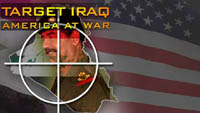 CBS |
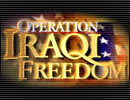 MSNBC |
|
BBC |
Photo Gallery from the Washington Post |
 The Washington Post |
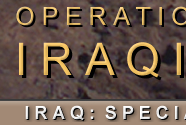 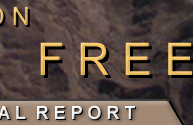 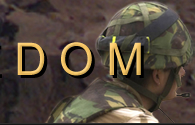 The White House, Washington DC |
||
Anti-war Propaganda
Although not as omnipresent (at least in the US), English-language anti-war propaganda is also available. While it may be tempting for Americans (especially American propagandists) to dismiss it as lies or treason, it appears no less true than US pro-war propaganda. The difference is that it focuses on presenting the consequences of American actions, rather than the purported atrocities of the Iraqi government. As such, it was vigorously attacked in the US, especially after American military forces attacked Iraq in March 2003. Al-Jazeera, the Arabic all-news cable channel that was the most visible anti-war voice in the middle east, even had its web sites knocked out near the end of March 2003, a day or two after it put up an English language site. Speculation had it that hackers in the US had done the deed, but no evidence for who did it has been found. Despite that cyber-attack, as of this writing, the site (http://english.aljazeera.net/) is available again. Links to it and other sites are included in the following table. Use them as a source of anti-war material for analysis and study.
|
The Guardian |
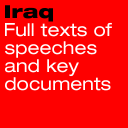 The Guardian |
Al-Jazeera |
| AlterNet | Photos of Iraqi casualties |
ZNet Iraq Watch |
|
The estimate below is calculated from a formula provided by Costofwar.com Compare this number to the cost estimates made by the Bush administration as it was attempting to sell the public on the value of going to war in 2002 and early 2003 (they seemed to promise it would cost a maximum of $60 billion). (This NPR report is also on point.) For a look at how such a sum could have otherwise been put to use, read John Allan Paulos' February 2007 Who's Counting column at ABCNews.com. A conservative estimate of the likely overall cost of the war and its aftermath is carefully projected in Joseph Stiglitz' and Linda Bilmes' 2008 book, The Three Trillion Dollar War: The True Cost of the Iraq Conflict. Amy Goodman interviewed Stiglitz and Bilmes on February 29, 2008. You may read the transcript as well as watch and/or listen to this interview at http://www.democracynow.org/2008/2/29/exclusive_the_three_trillion_dollar_war. Stiglitz and Bilmes were also interviewed on Fresh Air with Terry Gross on March 3, 2008. Audio of those interviews may be heard via links at http://www.npr.org/templates/rundowns/rundown.php?prgId=13&prgDate=3-3-2008.
|
||
|
Finally, do not miss the work of Micah Wright, a clever artist who has taken propaganda posters from World Wars One and Two, and converted them into contemporary antiwar posters. |
||
return to the Propaganda in the Classroom page
copyright © 2003-2009
classroomtools.com. All Rights Reserved.
original web posting: Thursday, April 24, 2003
last modified:
Sunday, May 17, 2009